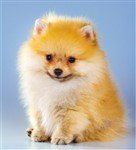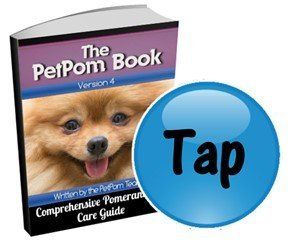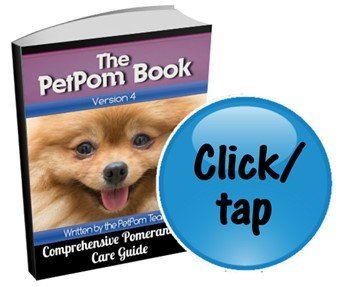Why Does My Pomeranian Stink / Have a Bad Odor?
Overview
It may seem puzzling when a Pomeranian looks nice and clean, but has a terrible odor. You may not know where it's coming from, but it's strong enough to make you scrunch your nose and leave you scrambling to somehow fix the mysterious odor.
It may seem worse at times, such as after being outside in the rain, may seemingly come and go randomly, or it may be a constant, chronic issue.
Regardless, this section will cover the top 7 reasons that a Pomeranian may smell bad, and exactly how to resolve each one.
We'll also go over some helpful tips to keep a Pom puppy or dog smelling nice and fresh all of the time.
Please note:
PetPom is reader-supported, and some of the product suggestions on this page are affiliate links. As an Amazon Associate we earn from qualifying purchases. This is at no extra cost to you and helps keep this site running.
Reasons a Pomeranian May Have a Terrible Smell
The top 7 reasons a Pomeranian may have a bad odor are:
1. Anal gland leakage
2. Fecal matter or urine on the coat
3. Interaction of skin microbes on a wet coat
4. Skin yeast infection
5. Improper timing and/or bathing techniques
6. Halitosis
7. Flatulence
Since some of these come as a surprise to many owners, it's suggested to go through these one by one to rule out all possibilities. So, let's dive into the details:
#1 Anal Gland Leak or Breakage
What happens:
All dogs have a pair of anal glands, also known as anal sacs or scent glands; one is located on each inside edge of the anal opening. These glands hold a special scent oil.
A small amount of this fluid is released when dogs greet each other, and a small amounts are also normally released when a dog has a bowel movement. However, these glands can sometimes overfill with oil; one cause of this is stools that are overly soft.
The fluid inside has one of the most obnoxious odors you can imagine. It's extremely overwhelming.
If the glands become over-filled, the stretched skin can cause quite a bit of itchiness. This can cause a dog to scoot their rear-end along the ground due, and this action can cause one or both glands to rupture.
If the anal glands fully rupture, you'll know it. You'll see a streak of dark fluid on the ground and it will smell worse than a skunk.
However, if the skin develops a small tear, it may not seem as obvious, but just a small amount of this highly stinky fluid is enough to make an entire Pomeranian smell quite bad. And in the cases of slowly leaking oil, this can get onto a Poms' bed, the carpeting, etc. creating a 'cloud' of odor that surrounds your dog.
What to do:
You may be able to see that the area looks swollen and inflamed. But, either way, if you suspect this, it is best to have the veterinarian do an examination. In some cases, the sacs will need to be flushed and antibiotics (oral and/or topical) may be given to ward off infection.
The area will be sore for some time, and you'll have to be very careful when giving baths. Never wipe across it with a washcloth; but rather softly pat it.
Prevention:
Some dogs are prone to issues with the anal glands and need to have them routinely expressed. Both the vet and experienced groomers can handle this task.
If you suspect that soft stools are a cause, it can help to add 1 teaspoon of 100% real pumpkin to a Pom's daily diet (mixed into a meal). If that does not bring about firm enough stools, 2 teaspoons can be given.
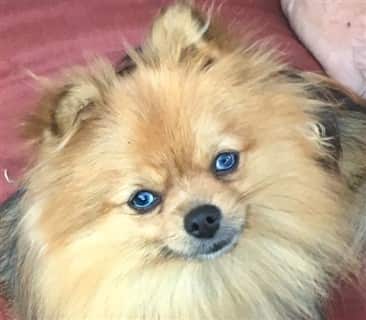
Princess, photo courtesy of Terri Szlovicsak
#2 Feces and/or Urine on the Body
What happens:
When a Pomeranian has a bowel movement, tiny pieces of feces can become stuck on the fine hairs around the anus. This is quite common since the hairs there can be relatively long if they are not trimmed. Just a small bit of feces can smell quite bad, and a buildup of tiny specks can be even worse.
When a Pomeranian pees, urine can splash up onto the coat. This is true for both males and females. The amount that splatters up will depend on the force of the urine stream and the type of surface that it is deposited on. For any coat other than white, the urine may not be obvious. Until it's washed away, it can smell very bad.
What to do and prevention:
• If your Pom is prone to bits of feces sticking to the coat, and this is due to stools being too soft, adding a teaspoon of 100% pure pumpkin to a daily meal can help firm the stools up.
• If this is due to long hairs around the anus, these can be trimmed. This is actually a very common grooming request; however, do choose your groomer wisely; we cannot count the number of times that an owner asked for a simple shave or trim to keep things tidy, but the groomer went wild, shaving half the coat off.
If your Pom tolerates grooming procedures with you, using a timmer like the Andis EasyClip 7-Piece Clipper Kit
 can allow you to do this from comfort of your home. Start with the 3/8" clip, and then go down to the 1/4" if needed.
can allow you to do this from comfort of your home. Start with the 3/8" clip, and then go down to the 1/4" if needed.
• You can also use a special wipe like Petkin's Tushie Wipes
 to clean the area after bowel movements.
to clean the area after bowel movements.
• For stinky urine splattering issues, you can use that same type of tushie wipe, or a grooming wipe like Earthbath All Natural Mango Tango Grooming Wipes .
.
Note that these Mango Tango ones are wonderful for providing a fresh, clean fragrance. But, their regular hypo-allergenic ones, or their special ones for puppies are also fantastic for regularly wiping down the coat to keep allergens off a Pomeranian that has allergies, and to keep a Pom clean in between baths.
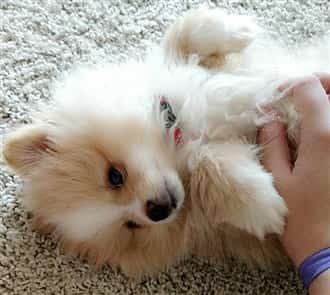
Michelangelo "Mikey", at 3 months old, photo courtesy of Rachael Jordahl
#3 Wet Coat
What happens:
The skin on all canines naturally holds a certain number microorganisms (yeast and bacteria) that can release quite stinky compounds; don't worry, most of the time they are at normal levels. There is usually not enough to make a Pomeranian smell bad.
However, the actual number can vary from time to time, and when the coat gets wet (and particularly if the number of yeast and/or bacteria is a bit high), the water can displace these microbes enough that you'll start to smell them.
This is most commonly apparent after a Pomeranian has gotten soaked by the rain because there is no nice-smelling shampoo to help counter this.
But, this can also happen after a bath. If due to yeast on the skin, a Pomeranian may smell after a bath because the scent of the shampoo may have covered the odor very temporarily; after the fragrance wore off, the odor of the microbes became noticeable.
What to do:
If you believe that your Pom may have an actual yeast infection
(signs include a very musty scent at all times, not just when wet, and/or oily skin), see reason #4, next.
But, if this is not suspected, and the smell only occurs right after a Pom gets wet, see below.
For smelling after being in the rain:
• Try to avoid grassy areas when it's raining; though, this is
hard if you're taking your Pom out for bathroom needs.
• Don't let your Pomeranian get drenched by the rain. Most Poms don't like this at any rate, and intolerance to being outside on rainy days can interfere with housebreaking and daily exercise.
You can use a pet umbrella; owners of large dogs are rarely happy with these nifty inventions; but for toy dogs, one like the LesyPet Pet Umbrella With Leash
 can work great.
can work great.
Or, you an place a cute yet functional raincoat on your Pom. The Ellie Dog Wear Zip Up Dog Raincoat
 is one of the few that comes in size extra-small to fit tiny Poms. And, this has an adjustable drawstring, removable hoodie, is completely water-proof, and has a small opening for the leash to connect to your Pom's harness.
is one of the few that comes in size extra-small to fit tiny Poms. And, this has an adjustable drawstring, removable hoodie, is completely water-proof, and has a small opening for the leash to connect to your Pom's harness.
• If you're not using an umbrella or a raincoat and your Pom gets wet outside, you can dry the coat with a blow dryer set on low. Spritzing with some leave-in coat spray can only help (more ahead under 'Keeping a Pom Smelling Nice). Note
that if the coat smells after this, it will be time to look to a skin yeast infection as a possible cause (next).
If your Pom smells after getting wet from a bath:
• If you are using an inferior dog shampoo, it may be the wrong pH balance and/or not have the right ingredients to properly clean. It'll be time to reassess what you're using. Earthbath's entire line is fantastic; but, if your Pom tends to smell, their Mediterranean Magic Deoderizing Shampoo
 is a great choice.
is a great choice.
• When you give your Pomeranian a bath, it's important that you reach deep down through the double-thick coat and reach the skin. Use a nozzle to wet the coat down. Be sure to keep parting the coat and massaging the roots all over the body. Use a nozzle to rinse once you are done.
Note
that if the coat smells after this, it is also a reason look to a skin yeast infection as a possible cause (next).
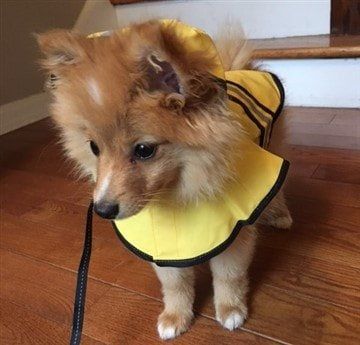
Marshall Brady, photo courtesy of Patti Arduino
#4 Yeast Infection
What happens:
As we discussed a bit earlier, there is always a certain amount of microorganisms on the skin; this includes yeast, fungi, and bacteria. While these are normally at a level that does not cause any problems, in some cases they can grow in numbers.
When this happens, it is referred to as an 'infection'. A yeast or fungal infection can make a Pomeranian smell quite terrible.
The trigger for this is not always known; however, it is commonly seen in breeds with skin folds (like the Pug), may happen more often in the summer, may be linked to a lowered immune system, seems to appear more with dogs that have allergies, and is seen alongside certain health conditions including Cushing's disease.
Other signs:
There are often other symptoms as well; however, in the beginning stages, a bad smell may be the only noticeable one. Left unaddressed, there is often also oily skin, oily looking coat, and itching. There may also be skin sores, a thickening of the skin, and/or dark spots on the skin.
Skin yeast infections typically have a very potent, musty-type smell. This may be equated with stinky wet socks or moth balls.
What to do:
There are two ways to treat this, an organic shampoo or a medicated shampoo. Let's look at these choices:
An organic shampoo to combat yeast
can work very well for some Pomeranians. This is a good choice if your Pom has highly sensitive skin, does not have reoccurring yeast issues, and/or if you just want to stay away from medicated products.
For this, we highly recommend Richard's Organics Anti-Bacterial Shampoo with Tea Tree Oil and Neem Oil ; these natural compounds can be very effective in treating this, as well as fungi and bacterial infections.
; these natural compounds can be very effective in treating this, as well as fungi and bacterial infections.
You will want to use this every 3 days, allowing it to remain on the coat for 10 minutes. If you do not see improvement after 2 weeks, it will be time to step things up with a medicated shampoo or see the veterinarian.
A medicated shampoo to combat yeast
may be needed for some Poms. This is a good choice if your Pomeranian has not shown a history of having overly sensitive skin, has had issues with yeast in the past, if organic shampoos have not proven to help, and/or if the yeast infection is raging at a severe level.
A con to this type of shampoo is that if a Pomeranian does not have a yeast infection, and is smelly due to another reason, the ingredients in this can cause skin irritation.
If you want to try a medicated shampoo, we recommend Curaseb's Antifungal & Antibacterial Shampoo for Dogs ; this is has both chlorhexidine and ketoconazole which are the two most widely used ingredients to combat yeast and fungus with dogs, has added aloe vera, has a nice cucumber melon fragrance, is made in the USA, and even has a no-question guarantee.
; this is has both chlorhexidine and ketoconazole which are the two most widely used ingredients to combat yeast and fungus with dogs, has added aloe vera, has a nice cucumber melon fragrance, is made in the USA, and even has a no-question guarantee.
This is typically used every 3 days, and it is important to lather up your Pom and allow it to soak for a full 10 minutes. If you do not see improvement after 2 weeks, it will be time to see the veterinarian.
It will be time to see the vet
if your Pomeranian does not respond to the shampoo. In some cases, dogs need to be given oral anti-fungal medications. Your vet can also rule out underlying causes of strong and/or reoccurring yeast infections.
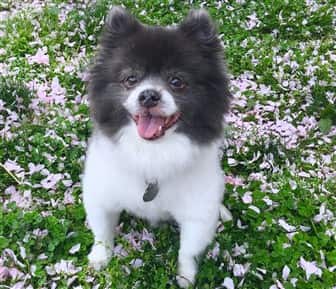
Teddy Puparazzi, photo courtesy of Nikko Kefalas
#5 Baths - Timing and Technique
What happens:
If you do not give your Pomeranian baths very often because your dog does not look dirty, but there's a mysterious stinky smell, this may because baths were indeed needed.
Baths are not just to remove visible debris and dirt. They are needed to wash away accumulated body oils. Natural body oils are produced round-the-clock. These help to keep skin moisturized. But, under that thick double coat, they do not evaporate, they just keep accumulating.
At just about the 3 week mark, there will be enough that if they are not properly washed away, a Pom will start to smell.
Along with this, is the issue that even if baths are given every 3 weeks, if the right products are not used and/or if you are not shampooing down to the skin, those oils will not be completely cleansed away.
What to do:
• Give your Pom a bath every 3 weeks, regardless of how clean your dog may look.
• Use superior products. Cheap ingredients and/or wrong pH balance can be the same as rinsing the coat down with water and nothing else. And since water and oil do not mix, those body oils will remain. The other risk of using inferior products is that it can affect skin and coat health (often causing issues with drying, which can lead to itching).
For shampoo, we highly recommend Earthbath Shampoo and Conditioner . There's so many great choices including Aloe & Oatmeal to prevent dry skin, a puppy formula, Tea Tree Oil for skin issues, Eucalyptus & Peppermint to soothe irritated skin, and even a formula to help remove stains from light colored coats.
. There's so many great choices including Aloe & Oatmeal to prevent dry skin, a puppy formula, Tea Tree Oil for skin issues, Eucalyptus & Peppermint to soothe irritated skin, and even a formula to help remove stains from light colored coats.
Be sure to follow with a great conditioner; Earthbath's Aloe & Oatmeal conditioner pairs nicely with any of their shampoos.
• Cleanse down to the skin. Take your time when you bathe your Pomeranian. Often, the kitchen sink will allow you a better washing angle than a bathtub, not to mention that many Poms find it less scary.
Use the nozzle to wet your Pom down. When you apply the shampoo, keep parting the coat with your fingers, and massage the skin. Use the nozzle again to thoroughly rinse away the product.
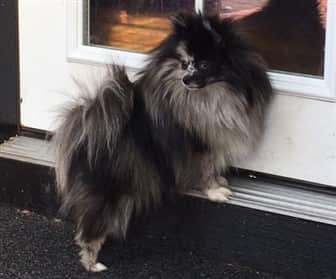
Cookie, at 10 months old, photo courtesy of Terri Szlovicsak
#6 Halitosis (bad breath)
What's happens:
While it's usually apparent that it is a Pom's breath that is stinky and it's not so much of a mystery where the bad odor is coming from, this is such a common issue that it has to be mentioned here. We do, however, have a full article regarding Pomeranian bad breath issues, that covers all possible causes and remedies.
To summarize, toy breeds like the Pomeranian are particularly prone to dental issues. Round the clock, plaque is being produced. It's a clear, stinky substance that clings to teeth. Just a build-up of plaque can be quite smelly.
But, it gets worse. Within as few as 3 days, it can start to harden into tartar, which is much harder to remove. These substances eat away at a dog's teeth. This can happen above, right along, or below the gum line.
Once that starts, there can be infections, which have their own horrible smell. Decay and infection are painful. And, this can lead to infections in the sinuses, eventual tooth loss, and/or full-body sepsis which is a life-threatening condition.
What to do:
• Have the veterinarian do a full examination. If there is infection or a thick build-up of tartar, this needs to be professionally treated.
• Stay on top of good dental hygiene for your puppy or dog.
Brush your Pom's teeth everyday with an effective canine paste and a properly sized canine toothbrush. With the Pomeranian being such a small dog, you may find that a brush designed for puppies like the one found within the Nylabone Advanced Oral Care Triple Action Puppy Dental Kit
 works well no matter your Pom's age.
works well no matter your Pom's age.
If your Pom will not tolerate brushings, until you work your way up to doing that, use a spray like Nylabone Advanced Oral Care Dog Dental Spray .
.
And always give a daily dental treat to help fight plaque and tartar. as well as make breath fresh like Greenie's Teenies . Note that because these types of treats are hard (to clean the teeth), it's recommended to supervise your Pom when he's chewing on this.
. Note that because these types of treats are hard (to clean the teeth), it's recommended to supervise your Pom when he's chewing on this.
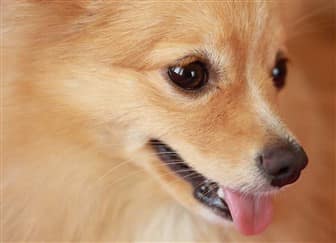
Peaches, photo courtesy of Uma Saran
#7 Flatulence
What happens:
Gas, farts, tooting, breaking wind... no matter the word that is used, incredibly stinky fumes can come from even a tiny Pomeranian. If a Pom has a chronic gas issue, a bad, eye-watering smell can seem to follow the dog around, and even permeate into his bedding.
The main cause of excessive gas with dogs includes a change in diet, eating too fast, and eating certain foods such as soybeans, beans, broccoli, oats, barley, beet pulp, too much protein (meat), and high-fat foods such as those that may be given as table scraps. Dogs that have a wheat sensitivity may have lots of gas (and other issues) with a dog food that contains wheat or grains.
There are also some health conditions that have excessive flatulence as a symptom. This includes but is not limited to exocrine pancreatic insufficiency (EPI), gastrointestinal infections, intestinal parasites, pancreatitis, inflammatory bowel disease, and allergies.
What to do:
• If you suspect any sort of health issue, do not delay in taking your Pom to the vet. Other signs include but are not limited to runny stools, diarrhea, straining to push out a bowel movement, foam or blood in the stools, swollen abdomen, changes in appetite, unexplained weight loss, lethargy, vomiting, and/or fever.
• Make sure your Pomeranian eats slow enough. While Poms may not eat a lot, it's all relative. So, take note of how fast your puppy or dog eats. You can encourage slower eating by feeding more frequent (yet smaller) meals, and/or offering half a serving before allowing for the next half.
While it's hard to find a slow-feeder bowl that is small enough for very tiny Poms (other than plastic ones which should be avoided), if your Pomeranian is near the 10-pound mark, a bowl like the DuraPet Slow-Feed Premium Stainless Steel Bowl
 can help.
can help.
• Take a look at the ingredients in your Pomeranian's main food and snacks; if they contain any of the gas-inducing ingredients, it may be time for a change. One of our top recommended foods is Wellness CORE Natural Grain-Free for Small Breeds .
.
This 100% wholesome food has no wheat, corn, soy, by-products, chemical preservatives, or artificial flavoring. It also has glucosamine and chondroitin for joint health, and great levels of omega 3 fatty acids. It is made in the USA. Note that this is ideal for any adult Pom 2-pounds and up.

Princess, photo courtesy of Dianne Brogan
Tips for Keeping a Pomeranian Smelling Nice
Keeping a Pomeranian clean and smelling fresh involves a lot more than what happens during a bath. Since baths should be given every 3 weeks, there needs to be some touch-ups in between.
You will find that these daily or weekly grooming tasks are also beneficial to help with a variety of issues, from removing allergens from the coat to preventing dry skin.
1)
Spritz the coat on a regular basis. A good leave-in is great for many reasons. It helps prevent split ends, protects from contact friction, creates a barrier from arid air and sun exposure, keeps the coat moisturized, helps prevent mats, and yes, keeps a dogs smelling sweet.
Be sure not to use too much since you don't want it to build up; a light misting over the body is all that is needed. You can
spritz your Pom and run your fingers through the coat for a quick touch-up, but since this breed needs to be brushed on a regular basis, spritz and brush at least 3 times per week. For Poms that are prone to tangles, a daily brushing may be needed.
A really great smelling spritz is Nootie Daily Spritz ; this comes in a range of super-awesome fragrances including Warm Vanilla Cookie, Japanese Cherry Blossom, Sweet Pea & Vanilla, Cucumber Melon, and Coconut Lime.
; this comes in a range of super-awesome fragrances including Warm Vanilla Cookie, Japanese Cherry Blossom, Sweet Pea & Vanilla, Cucumber Melon, and Coconut Lime.
2)
Use grooming wipes to touch-up. As we covered earlier, these are great to clean off bits of feces and splashes of urine. But, these also swipe off outdoor allergens, and can help keep a Pom smelling clean and fresh. The Mango Tango ones smell heavenly.
You May Also Be Interested In:
Pomeranian Tear Stains
- You may be surprised at some of the causes of this. Also includes exact steps to get rid of stains for good.
Male Pomeranian Discharge
- The different types of penile discharge issues that can happen with male dogs. Covers both normal and abnormal causes.
Female Pomeranian Discharge
- The different types of vaginal discharge that can happen with female dogs.
Helping a Pomeranian with Itching
- This is a very common yet extremely troubling issue that is seen with dogs, and the Pom is no exception. See the causes for itching, along with exact steps to remedy this for good.

